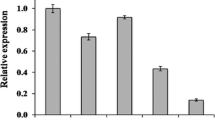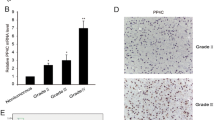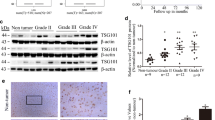Abstract
Pituitary tumor-transforming gene 1 (PTTG1) has been identified as an oncogene and is overexpressed in many tumor types. However, the role of PTTG1 in glioblastoma (GBM) has not been well characterized, especially in relation to angiogenesis, migration, and invasion. In the present study, our results showed that the expression of PTTG1 was significantly higher in patients with GBM. Bioinformatic analysis showed that angiogenesis and the cell migration-related process were increased in patients with high PTTG1 expression levels; meanwhile, PTTG1 was positively correlated with marker genes of angiogenesis, migration and the evasion of apoptosis. In vitro assays showed that PTTG1 knockdown dramatically suppressed angiogenesis, migration and invasion, and increased the apoptosis of GBM cells. Moreover, our results also showed that silencing PTTG1 suppressed the activity of the TGF-β/PI3K-AKT-mTOR pathway, which induced tumor deterioration in multiple organs. Overall, our findings indicate that PTTG1 is a glioma malignant factor that promotes angiogenesis, migration, invasion, and the evasion of apoptosis, and these roles may be related to the TGF-β/PI3K-AKT-mTOR pathway. Thus, the targeted inhibition of PTTG1 might be a novel therapeutic strategy and a potential diagnostic biomarker for GBM-targeted therapies.








Similar content being viewed by others
Data availability
All data used and/or analyzed during the current study are available from the corresponding author on reasonable request.
References
Herrlinger U, Tzaridis T, Mack F, et al. Lomustine-temozolomide combination therapy versus standard temozolomide therapy in patients with newly diagnosed glioblastoma with methylated MGMT promoter (CeTeG/NOA-09): a randomised, open-label, phase 3 trial. Lancet (London, England). 2019;393:678–88.
Lee JH, Lee JE, Kahng JY, et al. Human glioblastoma arises from subventricular zone cells with low-level driver mutations. Nature. 2018;560:243–7.
Gusyatiner O, Hegi ME. Glioma epigenetics: From subclassification to novel treatment options. Semin Cancer Biol. 2018;51:50–8.
Zeng W, Liu P, Pan W, Singh SR, Wei Y. Hypoxia and hypoxia inducible factors in tumor metabolism. Cancer Lett. 2015;356:263–7.
Rao JS. Molecular mechanisms of glioma invasiveness: the role of proteases. Nat Rev Cancer. 2003;3:489–501.
Heaney AP, Singson R, McCabe CJ, Nelson V, Nakashima M, Melmed S. Expression of pituitary-tumour transforming gene in colorectal tumours. Lancet (London, England). 2000;355:716–9.
Tong Y, Eigler T. Transcriptional targets for pituitary tumor-transforming gene-1. J Mol Endocrinol. 2009;43:179–85.
Lin X, Yang Y, Guo Y, et al. PTTG1 is involved in TNF-alpha-related hepatocellular carcinoma via the induction of c-myc. Cancer Med. 2019;8:5702–15.
Hu ZG, Zheng CW, Su HZ, et al. MicroRNA-329-mediated PTTG1 downregulation inactivates the MAPK signaling pathway to suppress cell proliferation and tumor growth in cholangiocarcinoma. J Cell Biochem. 2019;120:9964–78.
Su X, Chen J, Ni L, et al. Inhibition of PTTG1 expression by microRNA suppresses proliferation and induces apoptosis of malignant glioma cells. Oncol Lett. 2016;12:3463–71.
Fujii T, Nomoto S, Koshikawa K, et al. Overexpression of pituitary tumor transforming gene 1 in HCC is associated with angiogenesis and poor prognosis. Hepatology (Baltimore, MD). 2006;43:1267–75.
Xiang W, Wu X, Huang C, et al. PTTG1 regulated by miR-146a-3p promotes bladder cancer migration, invasion, metastasis and growth. Oncotarget. 2017;8:664–78.
Yoon CH, Kim MJ, Lee H, et al. PTTG1 oncogene promotes tumor malignancy via epithelial to mesenchymal transition and expansion of cancer stem cell population. J Biol Chem. 2012;287:19516–27.
Zhi T, Jiang K, Xu X, et al. MicroRNA-520d-5p inhibits human glioma cell proliferation and induces cell cycle arrest by directly targeting PTTG1. Am J Transl Res. 2017;9:4872–87.
Zhi T, Jiang K, Xu X, et al. ECT2/PSMD14/PTTG1 axis promotes the proliferation of glioma through stabilizing E2F1. Neuro-Oncology. 2019;21:462–73.
Cui LLT, Xu L, Wang G, Lin J, Feng S, Cao Y, Cao Y, Song Z, Jin X. The effect of down-regulated gene PTTG1 on proliferation, apoptosis, migration and invasion of human glioma cell SHG44. China Oncol. 2019;29:338–44.
Genkai N, Homma J, Sano M, Tanaka R, Yamanaka R. Increased expression of pituitary tumor-transforming gene (PTTG)-1 is correlated with poor prognosis in glioma patients. Oncol Rep. 2006;15:1569–74.
Schwartzbaum JA, Fisher JL, Aldape KD and Wrensch M. Epidemiology and molecular pathology of glioma. Nature clinical practice. Neurology. 2006: 2: 494–503; quiz 491 p following 516.
Wang X, Chen D, Gao J, et al. Centromere protein U expression promotes non-small-cell lung cancer cell proliferation through FOXM1 and predicts poor survival. Cancer Manag Res. 2018;10:6971–84.
Hamid T, Malik MT, Kakar SS. Ectopic expression of PTTG1/securin promotes tumorigenesis in human embryonic kidney cells. Mol Cancer. 2005;4:3.
Huang JL, Cao SW, Ou QS, et al. The long non-coding RNA PTTG3P promotes cell growth and metastasis via up-regulating PTTG1 and activating PI3K/AKT signaling in hepatocellular carcinoma. Mol Cancer. 2018;17:93.
Ren Q, Jin B. The clinical value and biological function of PTTG1 in colorectal cancer. Biomed Pharmacother. 2017;89:108–15.
Shono T, Mizoguchi M, Sasaki T. Latest treatment strategies for malignant gliomas. Fukuoka Igaku Zasshi. 2007;98:333–6.
Wen PY, Kesari S. Malignant gliomas in adults. N Engl J Med. 2008;359:492–507.
Zhang G, Zhao Q, Yu S, Lin R, Yi X. Pttg1 inhibits TGFbeta signaling in breast cancer cells to promote their growth. Tumour Biol. 2015;36:199–203.
Demin DE, Bogolyubova AV, Zlenko DV, et al. The novel short isoform of securin stimulates the expression of cyclin D3 and angiogenesis factors VEGFA and FGF2, but does not affect the expression of MYC transcription factor. Mol Biol. 2018;52:508–18.
LoPiccolo J, Blumenthal GM, Bernstein WB, Dennis PA. Targeting the PI3K/Akt/mTOR pathway: effective combinations and clinical considerations. Drug Resist Updates. 2008;11:32–50.
Chen XF, Zhang HJ, Wang HB, et al. Transforming growth factor-beta1 induces epithelial-to-mesenchymal transition in human lung cancer cells via PI3K/Akt and MEK/Erk1/2 signaling pathways. Mol Biol Rep. 2012;39:3549–56.
Dong F, Liu T, Jin H, Wang W. Chimaphilin inhibits human osteosarcoma cell invasion and metastasis through suppressing the TGF-beta1-induced epithelial-to-mesenchymal transition markers via PI-3K/Akt, ERK1/2, and Smad signaling pathways. Can J Physiol Pharmacol. 2018;96:1–7.
Jiang X, Zhang Z, Song C, et al. Glaucocalyxin A reverses EMT and TGF-beta1-induced EMT by inhibiting TGF-beta1/Smad2/3 signaling pathway in osteosarcoma. Chem Biol Interact. 2019;307:158–66.
Funding
This study was supported by Grants from the Fundamental Research Funds for the Central Universities (No. 20720180042), the Health Science Research Personnel Training Program of Fujian Province (2016-CXB-12), the Natural Science Foundation of Fujian, China (No. 2016D019).
Author information
Authors and Affiliations
Contributions
YLC and JX designed the experiments and drafted the manuscript. CLS, RT, SZH, GXM and FDR performed the study, and ZHT, CSD, ZMS performed the statistical analysis. ZRG revised the manuscript. All authors have read and approved the final manuscript.
Corresponding authors
Ethics declarations
Conflict of interest
The authors declare that they have no conflict of interest.
Additional information
Publisher's Note
Springer Nature remains neutral with regard to jurisdictional claims in published maps and institutional affiliations.
Electronic supplementary material
Below is the link to the electronic supplementary material.
Rights and permissions
About this article
Cite this article
Cui, L., Ren, T., Zhao, H. et al. Suppression of PTTG1 inhibits cell angiogenesis, migration and invasion in glioma cells. Med Oncol 37, 73 (2020). https://doi.org/10.1007/s12032-020-01398-2
Received:
Accepted:
Published:
DOI: https://doi.org/10.1007/s12032-020-01398-2




